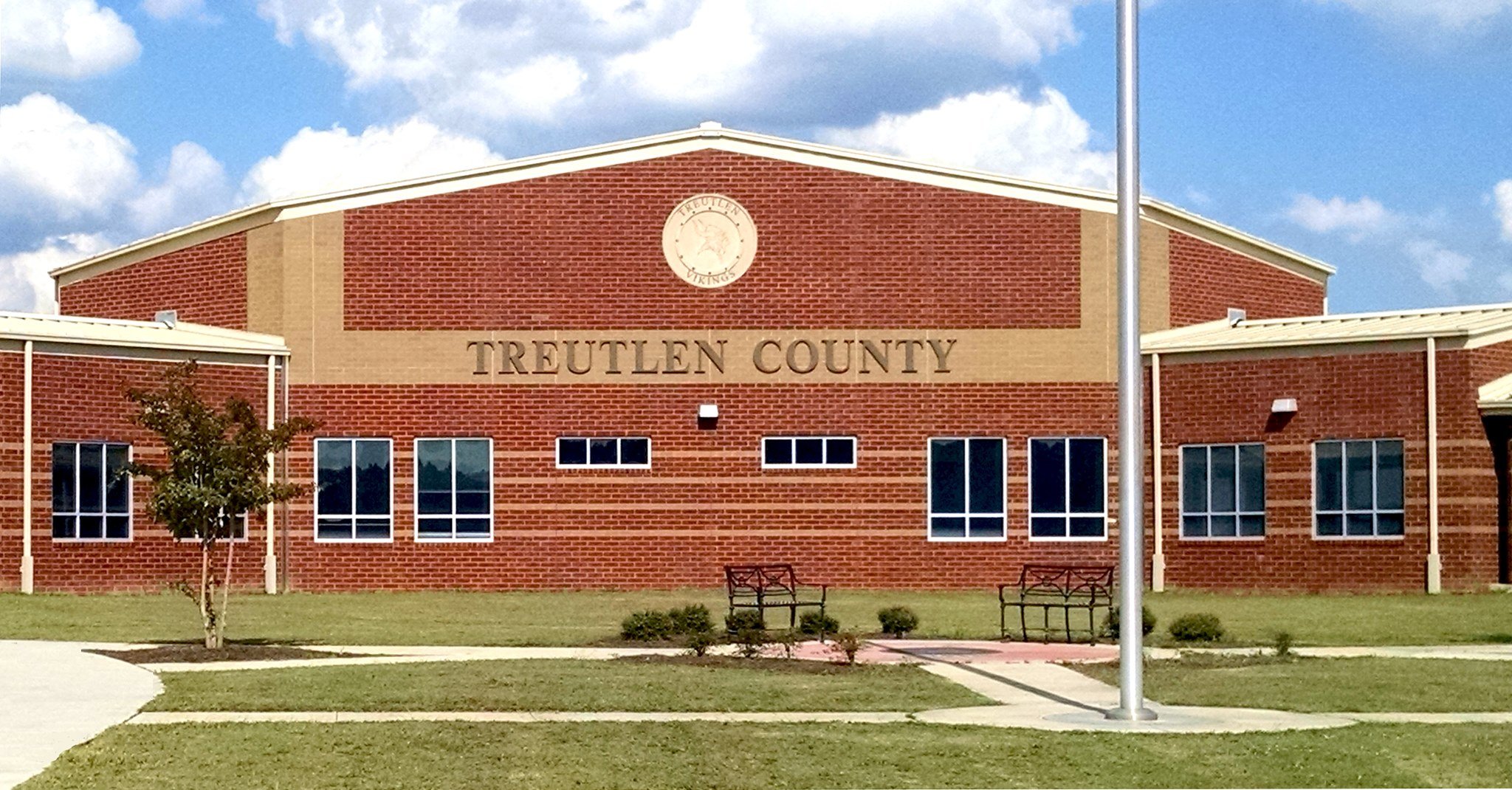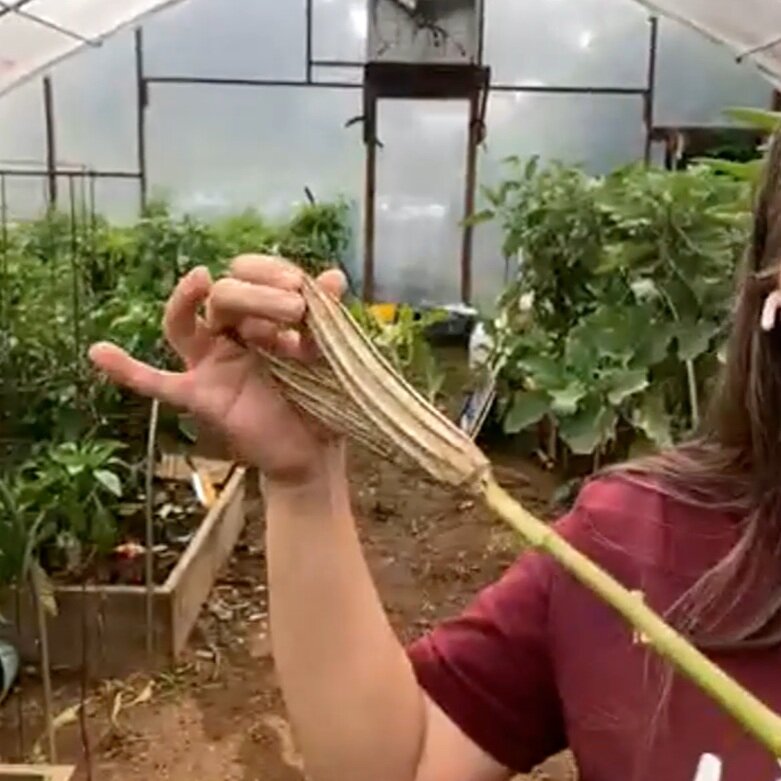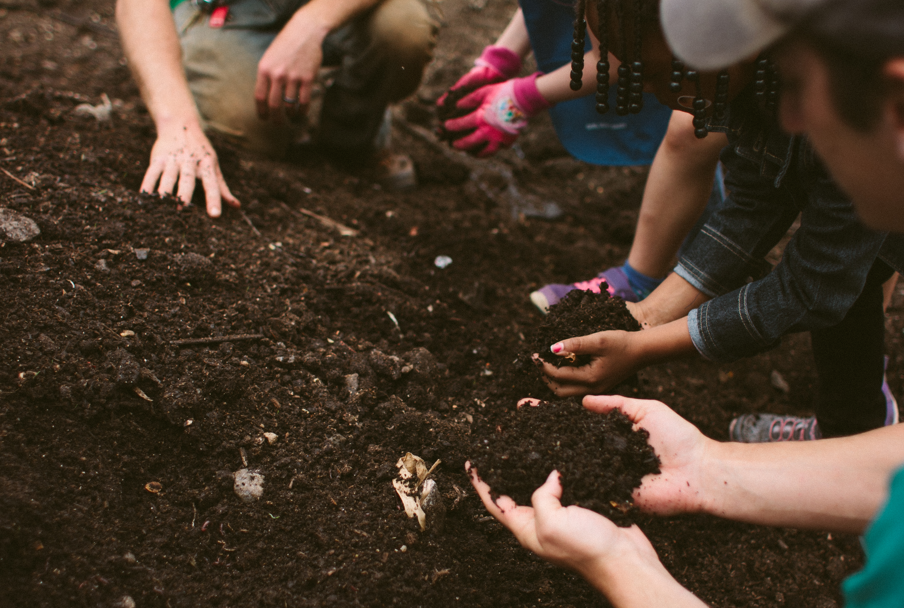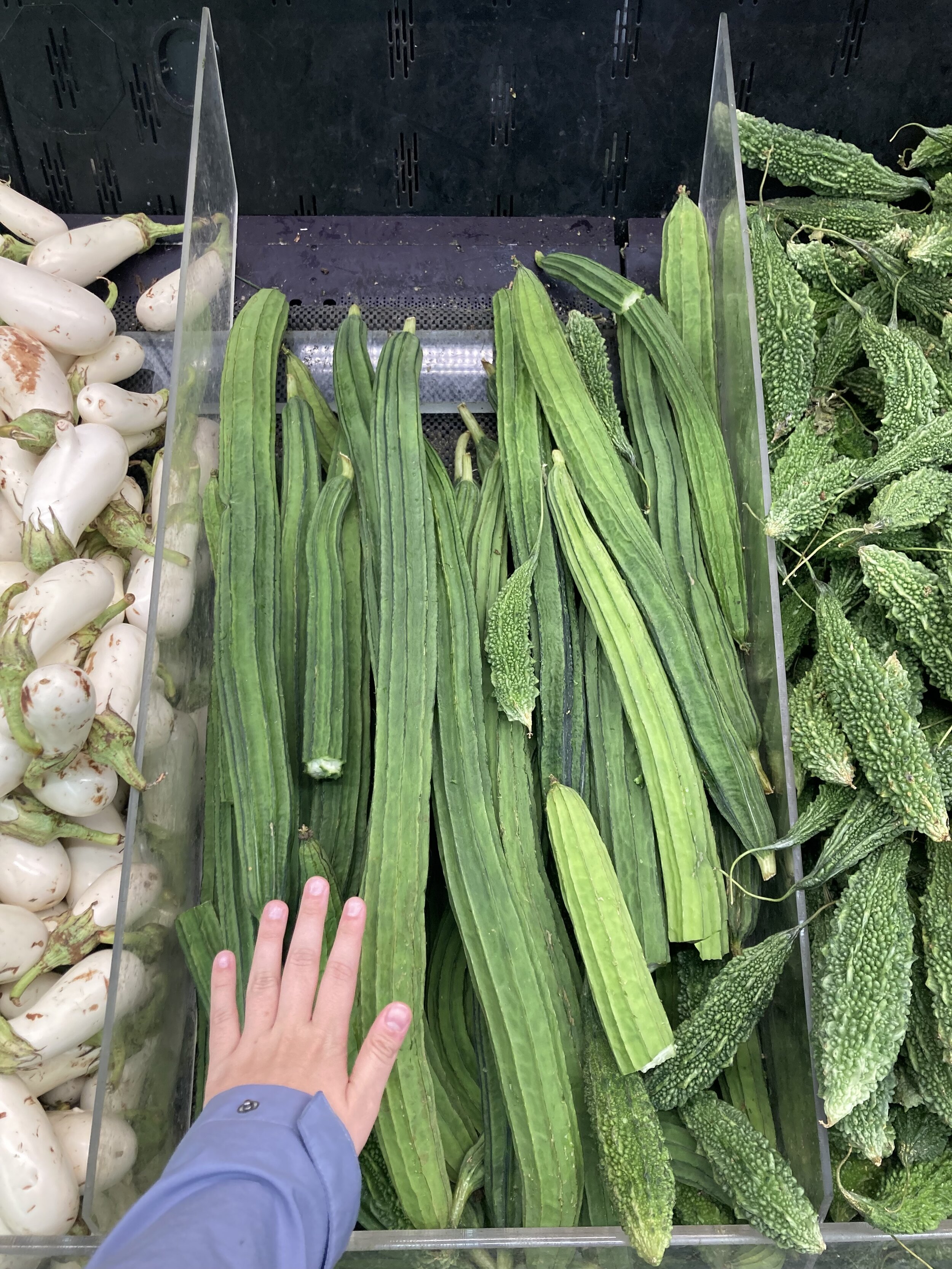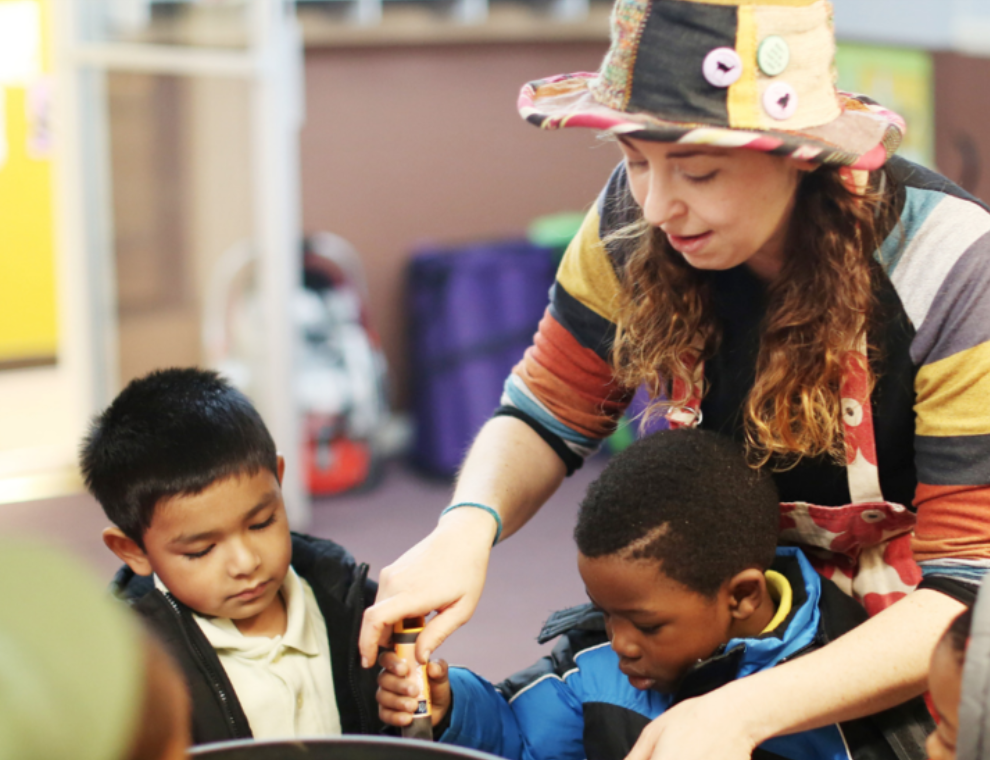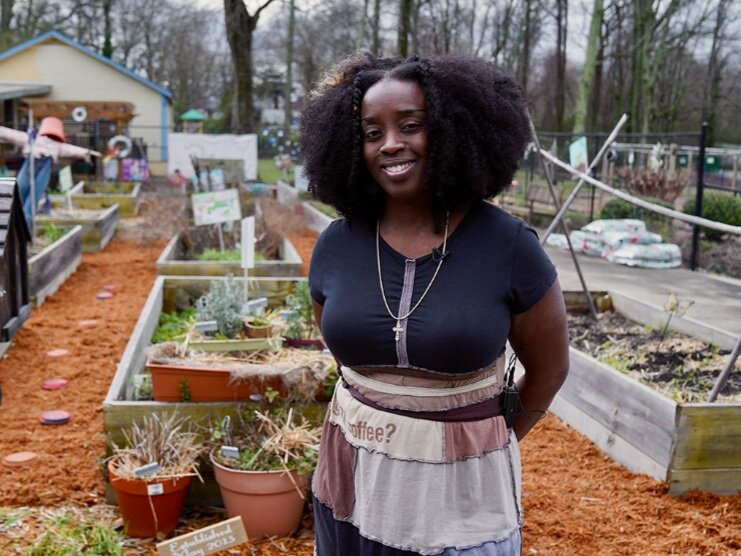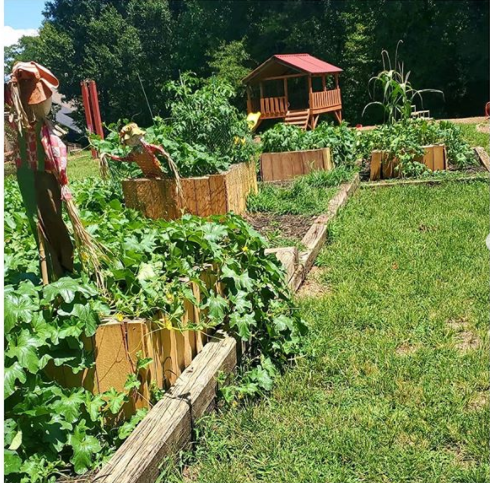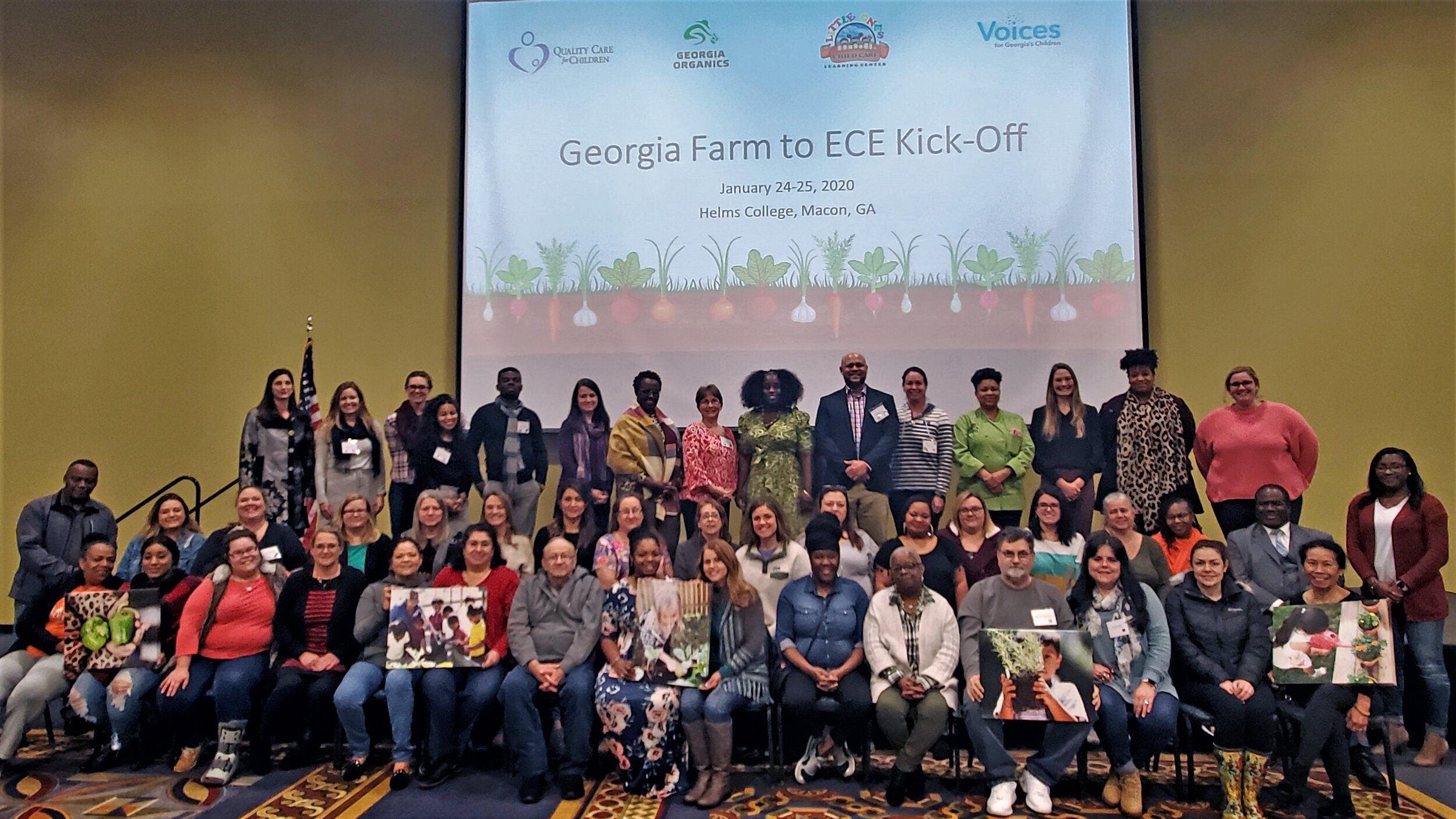FARM TO SCHOOL
While some consider coffee grounds, fallen leaves, potato peels, and yesterday’s newspaper as just a few more items to stuff into the garbage, one man’s trash is another man’s treasure.
The natural process of recycling organic matter like kitchen scraps, leaves, twigs, and yard trimmings back into a valuable and highly-treasured soil-like material is called composting.
Yaza Sarieh recently stumbled upon Chinese Okra at her local Indian grocery store and tells the story of what she discovered about it.
"When I made my way around the produce section, I finally saw it – this three-foot-long, dark green, ridged, narrow, tough vegetable is known as Chinese okra...”
Last week the Farm to School team gathered on a hot, sunny day at Cosmos Farm in Carrollton, GA to start livin’ Livin’ la Vida Okra with Farmer John and Little Ones Learning Center’s garden educator Farmer Trin and their PreK class!
Since March 2020, food assistance in Georgia has increased almost 300% to address COVID-19 related food insecurity. To confront these unprecedented challenges, organizations within the metro-Atlanta area have partnered with the Captain Planet Foundation to develop Project Giving Gardens that cultivate and distribute produce to meet the needs of thousands of Georgia families and children.
Leah Penniman and Matthew Raiford Discuss Opportunities for Equity, Justice and Food Sovereignty in the Farm to School and Early Care and Education Movement
In communities throughout Georgia and the United States, racial inequities create food insecurity, and food insecurity creates racial inequities. During this year’s Georgia Farm to School and Early Education Virtual Summit, Leah Penniman of Soul Fire Farm and author of Farming While Black and Chefarmer Matthew Raiford of Gillard Farms will teach us how Farm to School and Early Care and Education strategies can work to develop an equitable, just, and culturally responsive food system for all.
Click below to read more about these and other food and education stars of the Farm to School and Early Education Virtual Summit.
“In Farm to School and ECE, I love the shift that is taking place to incorporate the whole child. Rather than thinking that food is just fuel, food is starting to be used in other components of childhood wellness such as mental and emotional health or physical health.”
Farm to ECE initiatives are a wonderful tool to educate children about the complexities of life, whether it is the different dynamics at play when procuring local foods, the importance of health and well-being, or the value of our environment. Wendy Palmer, a registered dietitian and certified health education specialist, has found ways to weave these different topics into garden and nutrition education.
“We have a strong Farm to School and ECE Alliance and Coalition in Georgia, and I am looking forward to learning from the expertise of the diverse partners and connecting with them.”
Partnerships make Georgia Farm to ECE stronger, something Dr. Caree Cotwright has experienced firsthand. A professor in the UGA Obesity Prevention lab, Dr. Cotwright, has been working with the State Botanical Garden in Athens, Georgia to use Farm to Early Care and Education as a strategy for preventing childhood obesity.
Read on about Dr. Cotwright and her role in 2021 SUMMIT!
We are celebrating okra this October for National Farm to School Month, but preparations will begin long before October! If you want your school garden to be ready with a bountiful okra harvest, you should plant your okra before you come back for school in the Fall. Okra takes a few months to get to the point where it is producing vigorously, but once there, it will give and give until the first frost. For the most bountiful okra harvest, we recommend planting your okra either before school gets out in May or during the summer break, in June or July.
Read more about preparing your school garden by clicking below!
“I am so excited to see all of the wonderful human beings at Summit who make such an impact in Georgia F2ECE. When you embrace F2ECE as part of your mission, it opens lots of possibilities and safe, entertaining, healthy doors with loads of positive outcomes for children.”
Ms. Ladybug is the embodiment of her name—she is a garden-warrior and an exuberant advocate for F2ECE as a means of teaching children about the world around them.
“There is no right or wrong answer to Farm to School/ECE—as long as you’re doing something, you’re doing the right thing.”
Wande Okunoren-Meadow is the director and educator at Little Ones Learning Center in Forest Park, where she utilizes Farm to Early Care and Education (ECE) practices to support the development of the whole child.
Wande will be one of the speakers at this year’s Farm to School Summit, where she will discuss ways Farm to ECE can address inequities and communal needs while also providing us with tips for Farm to ECE best practices in the classroom.
To celebrate Women’s History Month and women in agriculture, we’d like to highlight the contributions to organic agriculture and Farm to School in Georgia by a trail-blazing woman, Georgia farmer, and newly-elected Georgia Organics board member, Loretta Adderson!
LEARNING BEYOND THE CLASSROOM: FULTON COUNTY SCHOOL NUTRITION CELEBRATES BLACK HISTORY MONTH
Denielle Saitta, the Fulton County School Nutrition Program Project Manager of Marketing and Communications, is affectionately known by her team as “the School Nutrition Cheerleader.”
Each month Fulton cafes recognize a different cultural cuisine to explore nutrition, culture, and culinary traditions while marketing the offerings of their menus. This initiative celebrates the many cultural backgrounds that make up Fulton County Schools’ students, teachers, and staff. This month they are celebrating Black History Month, honoring Black culture and remembering those who have made great strides throughout history.
We enjoyed some much-needed, light fun in our virtual Good Food for Thought farm to school workshop last Wednesday, which was all about indoor gardening activities you can do with children, especially during the winter.
Teacher and farm to school extraordinaire, Jenna Mobley led us through a brief overview of a seed’s basic needs with a catchy song to go along, as well as what is possible to direct-seed outdoors when it’s cold. Then she took us on a deeper dive into practical and innovative ways you can start seeds indoors, as well as other gardening explorations you can do with kids inside, connecting all of these ideas to Georgia education standards and real, practical lessons.
Little Ones Learning Center is a model of Farm to ECE in Georgia. The school garden is a place of learning and exploration, where students gain the life skill of growing food and showing love and appreciation to Mother Earth. School meals and taste tests expose students to a variety of local fresh food to expand their palates, develop cultural awareness for where food comes from, and support brain development. This simply delicious sweet potato recipe is Little One's Learning Center Chef Shay's favorite holiday recipe, and it is sure to be one of yours.
Click below for a recipe of Chef Shay’s: BEST MASHED SWEET POTATOES
Some educators may think that getting small children to try fruits and vegetables can be a daunting task, but not for Arbendette Van. The director of Pre-K Preparatory Academy in Gainesville, GA, Arbendette Van has excited her students, faculty members, and families about local foods and nutrition education. Having joined the Farm to Early Care Education Collaborative over a year ago, Arbendette has done amazing work to incorporate Farm to Early Care Education in everything they do in the classroom.
After a career in the corporate world, Arbendette Van followed her lifelong passion for working with low-income communities and educating children by establishing the Pre-K Preparatory Academy.
Are you ready to Turnip the Volume with Chef Asata? As October Farm to School Month has drawn to a close, Georgia Organics would like to take some time to celebrate Chef Asata Reid.
An invaluable Farm to Early Care Chef Educator here at Georgia Organics, Chef Asata is a Farm to School all-star. She has almost two decades of experience as a professional chef and community health educator.
Fall is in the air, and Georgia Organics is excited to kick off our October Farm to School month by talking to a seasoned farm to school advocate and expert educator about how to engage kids around eating healthy foods.
Jenna Mobley is truly a farm to school rock star, and we’re so grateful for her work educating and engaging with young Georgians around healthy, local food.
We’re grateful to welcome Becky Griffin for this guest post, as she shares tips for seed saving, seed sharing, and their value in an education setting!
Becky is the Community & School Garden Coordinator for University of Georgia Extension. She is part of a team that received a grant to promote best management practices with seed saving in Georgia and she is on the Community Seed Network Advisory Council.
Click below to read more about “Seed Saving and Sharing Can Add Cultural Richness to Your School Garden.”
We're thrilled to welcome Kelley Toon as a guest contributor on Georgia Organics' blog, The Dirt. Toon is the Academic Nutrition and Support Manager at the Georgia Department of Education and is sharing her perspective on why food-based learning is so powerful. She also shares resources to help guide this learning. Thank you for joining us, Kelley, and for being a collaborator in Georgia Organics’ Farm to School program!
STUDENT LEARNING THROUGH SEED SHARING
Learning loss as a result of COVID 19 school closures will impact Georgia's rural and communities of color far greater than in higher resourced communities. As this New York Times article reports, students are falling behind due to disruptions in schooling. The current crisis is shining a light on structural inequalities while racial and socioeconomic gaps in education between low-income and high-income zip codes expand.
Looking ahead to the summer and next school year, school districts will grapple with budget cuts and implementation of COVID 19 health and safety procedures. Parents and community organizations are being called upon to support student learning more than ever.
In an effort to support active, experiential learning while strengthening community Farm to School connections, we’ve created the Georgia Organics Seed Sharing Toolkit.
Evans County School Nutrition serves families during pandemic
By Kimberly Della Donna
Stephanie Myers greeted Evans County families last Wednesday with a plethora of pandemic essentials, including big smiles, fresh food and home gardening materials. Students and their families were delighted to receive the seeds and activities during the 8th week of school closures in the area.
"The timing and weather proved perfect for promoting all of the physical, mental, social, and nutritional aspects of family gardening," said Stephanie, a UGA Extension 4-H Agent.
Stephanie joined a group of volunteers to help Evans County School Nutrition Director Tonya Beasley-Blocker and her school nutrition staff distribute meals to approximately 1,000 residents in Evans County. On Wednesdays, staff and volunteers distribute around 14,000 meals between seven breakfasts and seven lunches.
FARM TO EARLY CARE AND EDUCATION LEARNING COLLABORATIVE KICKS OFF NEW YEAR IN MACON
2020-2021 learning collaborative sites join with mentor sites, education leaders, and partner organizations to chart a healthy course forward.
By Nichole Fields, Georgia Organics Farm to School Assistant
In January, the second cohort of the Georgia Farm to Early Care and Education Learning Collaborative came together in Macon for a weekend of learning and action planning. The 2020-2021 Learning Collaborative consists of 12 early child education providers participating for the first time, as well as three providers from the inaugural cohort returning as mentor sites. All these sites will receive mini grants, educational materials, and technical assistance to help them incorporate more healthy food into meals and activities at their sites.
The Learning Collaborative was created in 2017 with support from the W. K. Kellogg Foundation. The multi-year initiative was created collaboratively by the following partner organizations: Georgia Organics, Little Ones Learning Center, Quality Care for Children (QCC), The Common Market, and Voices for Georgia’s Children . The goal of the Learning Collaborative is to provide a proof of concept for Farm to Early Care and Education (Farm to ECE) models featuring hands-on education in nutrition, cooking, gardening and promotion of local foods. The 2017 Learning Collaborative included 18 early care sites from metro Atlanta and south Georgia.














